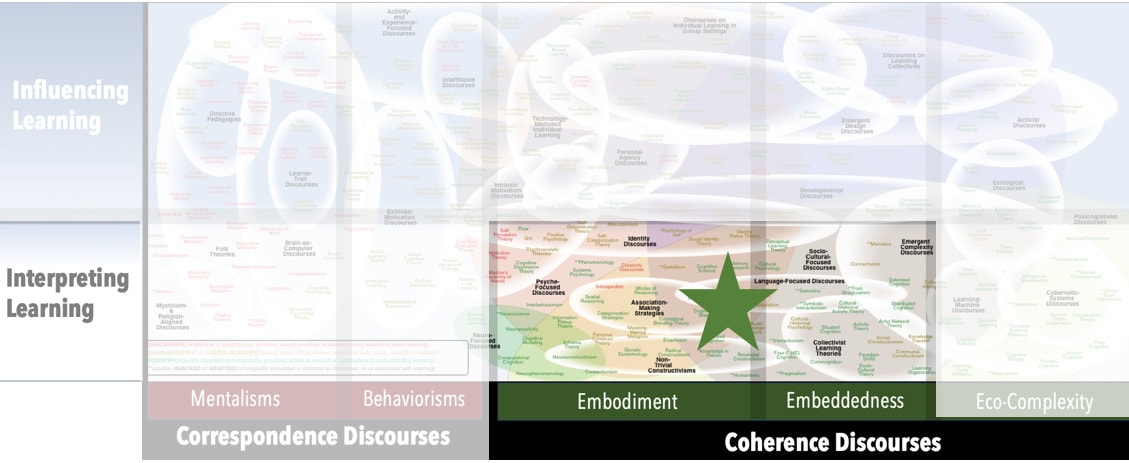AKA
Cognitive Metaphor Theory
Focus
The role of metaphor in weaving and maintaining webs of meaningPrincipal Metaphors
- Knowledge is … network of all established associations
- Knowing is … a web of associations
- Learner is … an associator (individual)
- Learning is … making associations
- Teaching is … selecting (experiences and metaphors)
Originated
1970sSynopsis
Taking up the Cognitive Science principle that human thought is mainly analogical/associative rather than logical/deductive, Conceptual Metaphor Theory looks at metaphor as a core tool of human thinking:- Metaphor – a language-based means of interpretation and reasoning that involves the mapping of one category of experience onto another
- Metaphorical Framing (George Lakoff, 2000s) – a reference to the manner in which one’s interpretations of a phenomenon (and actions based on those interpretations) are oriented and channeled – and can be manipulated – by the metaphors used to describe that phenomenon
- Analogical Coherence – the extent of fit between the source and target of an analogy, assessed according to similarities of structure and purpose
- Embodiment – within discourses associated with Conceptual Metaphor Theory, the suggestion that metaphor is means by which bodily experience is transformed into an abstract tool of thought
- Image Schema (Embodied Schema) (Mark Johnson, 1980s) –associated with Conceptual Metaphor Theory, a type of Schema in which concrete bodily action serves as the source of an abstract conceptual metaphor
- Indexical Understanding (Indexical Hypothesis) (Arthur Glenberg, 1990s) – the suggestion that "indexing" – that is, associating a word with an experience or object — affords meaning, enables comprehension, and guides one's interpretations of a language
- Literalization (Dead Metaphor) (Richard Rorty, 1980s) – the rendering literal of a figurative device, in a way that makes it difficult to be conscious of or to recover the original figurative meaning
- Metaphoric Transfer Effect (2000s) – the spontaneous (i.e., nonconscious) act of imposing qualities from one domain of experience onto another, in a manner triggered by and consistent with the use of a metaphor
- Reification (Concretism; Hypostatization; Objectification) – the conceptual shift involved when an abstract phenomenon (e.g., event, thought, concept, value, belief) comes to be treated as a physical object – that is, a form that one might infer is stable and knower-independent, and something that can be acquired, shaped, manipulated, measured, relayed, etc.
Commentary
Since the 1970s, Conceptual Metaphor Theory has evolved from a niche theory into a core element of contemporary Cognitive Science. Across the decades, persistent concerns have been voiced about its empirical accuracy and over-enthusiastic claims of its explanatory power. While still present, such criticisms have been waning – owing in large part to the demonstrated utility of Conceptual Metaphor Theory to make sense of such diverse phenomena as politics, cognition, and mathematics.Authors and/or Prominent Influences
George Lakoff; Mark JohnsonStatus as a Theory of Learning
Conceptual Metaphor Theory is a theory of learning. Among its major contributions, the theory has offered testable explanations on how bodily experience comes to serve as the basis of conceptual understandings, how worldviews arise and persist, and how dramatically new insights emerge.Status as a Theory of Teaching
Conceptual Metaphor Theory is not a theory of teaching. However, it is proving influential in efforts to distinguish among experiences and interpretations that are woven into key concepts, thus enabling educators to select and emphasize more powerful metaphors and to avoid less useful ones.Status as a Scientific Theory
As research methods have been refined and more evidence assembled, Conceptual Metaphor Theory has been demonstrated as a robust scientific theory.Subdiscourses:
- Analogical Coherence
- Embodiment
- Image Schema (Embodied Schema)
- Indexical Understanding (Indexical Hypothesis)
- Literalization (Dead Metaphor)
- Metaphor
- Metaphoric Transfer Effect
- Metaphorical Framing
- Reification (Concretism; Hypostatization; Objectification)
Map Location

Please cite this article as:
Davis, B., & Francis, K. (2024). “Conceptual Metaphor Theory” in Discourses on Learning in Education. https://learningdiscourses.com.
⇦ Back to Map
⇦ Back to List
